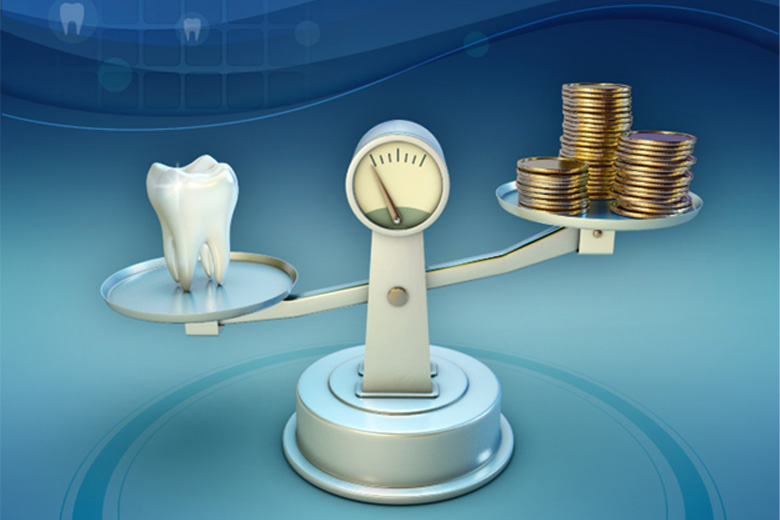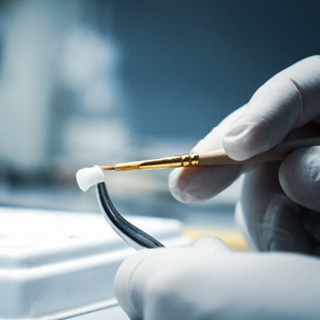Restoring & Protecting Compromised Teeth

Are you struggling with damaged or decayed teeth? Whether this was due to accidental impact during contact sports or simply gradual erosion, you’ll want to repair your smile before any further complications arise. That’s where dental crowns come in! These “dental caps” can provide a protective covering that will strengthen your tooth while also making it look full and natural. Our team also provides this treatment through CEREC technology, meaning you’ll be able to receive your restoration after a single visit. Read on to learn more about this treatment, how dental crowns are made, and what to expect from the results.
Why Choose Michelsen Dental for Dental Crowns?
- Durable & Tooth-Colored Dental Materials
- Same-Day Dental Crowns Available
- Convenient Appointment Times
What Is a Dental Crown?
A dental crown is made of synthetic material, usually zirconia or porcelain, and is used to strengthen and protect the tooth. Our porcelain crowns are used to repair damage when too much of the original tooth has been lost. They are also used to cover teeth that are badly shaped or discolored. Many of our dental crowns, also known as teeth caps, are designed to look and feel natural, enhancing the appearance of your smile.
The Dental Crown Process

Having a traditional dental crown fitted is pretty simple and can take a couple of appointments to complete. First, your team will examine your mouth to see if you’re eligible for the procedure. If so, they can start by removing a thin layer of your enamel to make room for your restoration. They’ll take impressions of your smile and send them to a dental lab for fabrication. Meanwhile, you’ll wear a temporary crown to keep your tooth safe. Once your final restorations are finished, you’ll return to your dentist to have them placed with special dental cement.
Fortunately, Dr. Michelsen has equipped our office with CEREC, a state-of-the-art technology that allows us to create crowns and place them in one visit! When you come into our office for a dental crown, we can take a digital imprint of your teeth and then manufacture a new crown while you wait. This is especially convenient when a patient needs a root canal, a procedure that used to take several visits to complete.
The Benefits of Getting a Dental Crown

Dental crowns come with a wide variety of advantages for your oral and overall health, including:
- Restoring the function of your smile
- Helping damaged teeth become stronger
- Enhancing the aesthetic of your smile
- Increasing self-confidence in your smile
- Preventing future damage and/or infection
Understanding the Cost of Dental Crowns

Dental crowns are ideal for protecting compromised teeth from additional damage. However, it is important to consider the cost ahead of time so that you don’t end up with unnecessary surprises. We won’t be able to determine the exact cost of your dental crown till you visit us. In the meantime, here are some of the factors that are considered.
Factors that Affect the Cost of Dental Crowns

Many different factors are considered when determining the price of dental crowns. Here are the most prominent ones:
Severity of Damage
If your tooth is very damaged, you may need other treatments in addition to your dental crown. For example, if your tooth is infected, you may need to have root canal therapy before you get your crown.
Materials Used
Dental crowns can be made from many different materials, and they are all at different price points. At Michelsen Dental, we use porcelain because of its durability and lifelike appearance.
Method Used
Same-day restorations often have different costs than traditional methods.
Remember that cheaper isn’t better when it comes to dental restorations. Your dental crown is going in your mouth so it’s very important that it is quality. By investing in a good dental crown, it can last for many years down the road.
Does Dental Insurance Cover Dental Crowns?

Dental crowns are considered to be a major dental procedure, so your insurance provider will likely cover about 50% of the cost. If you are having difficulty understanding your plan and what it covers, we can help. We are also happy to file insurance for your reimbursement as long as you are free to choose your own dentist.
Other Options for Making Dental Crowns Affordable

If you don’t have dental insurance, this doesn’t mean that you will be left completely on your own. With our Dental Plan, you can save 20% on general dentistry and cosmetic services completed at our practice. We also work with CareCredit – a third-party financing company that can split the cost of your treatment into manageable monthly installments with little to no interest. For more information about your financial options, don’t hesitate to talk to one of our friendly team members.
To find out the exact cost of your dental crown, schedule a visit with us. We are eager to restore your smile to health!
Dental Crowns FAQs

Do Dental Crowns Get Cavities?
Dental crowns can’t actually get cavities, as they’re not made of enamel. However, the teeth underneath them still can.
In reality, a crowned tooth has the same risk of decay as an uncrowned one. Bad bacteria and plaque could form around the former’s gumline. From there, they’d travel beneath the crown and erode the underlying tooth.
Of course, you can prevent cavities in crowned teeth. Just practice good oral hygiene! In particular, remember to brush twice daily, floss once daily, and visit your dentist often. Also, don’t eat too many sugary foods and drinks. Sugar is a major cause of tooth decay.
Are Dental Crowns Safe?
When placed by a qualified dentist, a dental crown is quite safe. It shouldn’t cause any harm to your teeth, gums, or other mouth tissues.
You see, our office’s dental crowns are metal-free. That means they don’t contain mercury or other known toxins. Instead, they rely on materials like dental porcelain. Such substances won’t damage your mouth or the rest of your body.
Granted, a patient may react adversely to porcelain in rare cases. Even so, this sort of reaction is highly unlikely. Your dentist can also address it quickly and effectively. So, call your dentist at once if you suffer gum irritation, redness, or swelling.
Are Dental Crowns Permanent?
Technically, dental crowns aren’t permanent. They eventually stop working after a set amount of time. That said, crowns are a long-term solution for damaged and decayed teeth.
On average, a dental crown lasts anywhere from five to 15 years. It can effectively protect the underlying tooth during that period. In doing so, it’d help the pearly white survive longer than it would’ve otherwise.
Still, you can take steps to help your crown last. One way is to care for it with proper oral hygiene – twice-daily brushing, once-daily flossing, etc. At the same time, you could attend regular dental checkups or wear a nightguard.
What Happens If You Wait Too Long to Get a Dental Crown?
You really shouldn’t wait too long for a dental crown. As a rule, dentists will only suggest one when it’s needed. Therefore, putting off treatment would lead to oral health issues.
Remember, a tooth that needs a crown is decayed or damaged. Delaying your procedure will allow its decay or damage to worsen. (After all, the tooth will be exposed to chewing forces, food debris, and bacteria.) Given enough time, the chomper would then require a root canal or an extraction.
To help your natural tooth survive, get a crown soon after your dentist recommends it. You’ll then be better off and avoid expensive services.
 Request
Request